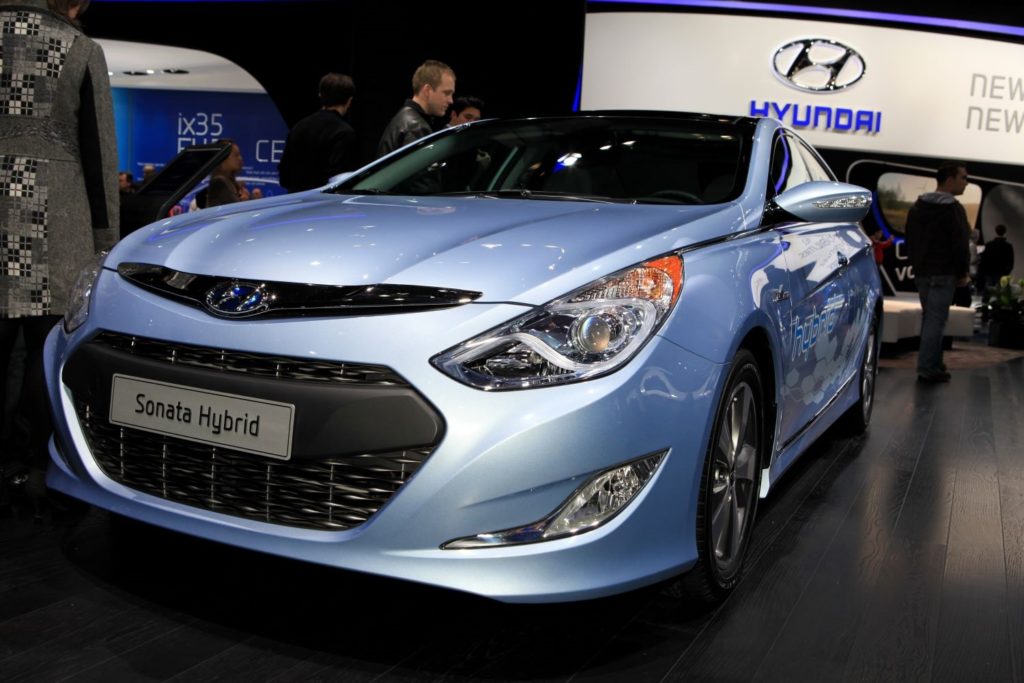Electric vehicles are constantly in the news these days, as more and more automakers announce plans to go all-electric in the near future. While you might not be ready to take the plunge and purchase a vehicle that runs solely on battery power, a hybrid could be an attractive alternative.
Since brand-new cars have become so expensive, finding a used hybrid is a particularly appealing option. Although shopping for a hybrid isn’t all that different from searching for any other type of used vehicle, there are some unique aspects that you’ll want to consider before making a purchase.
Tips for Buying a Used Hybrid Vehicle
There’s a common misconception that hybrid and electric vehicles (EVs) are the same thing. However, that’s not the case. Hybrids combine a gasoline engine with one or more electric motors (hence, the term hybrid). On the other hand, EVs are powered solely by electricity from a battery paired with electric motor(s)—there’s no gasoline engine onboard.
A typical hybrid vehicle has a gasoline engine, a high-voltage battery pack, and one or more electric motors. All hybrids use the electric motor(s) to assist the gasoline engine to some degree, thereby increasing fuel economy. The battery pack supplies electrical energy to the motors and can be recharged by the gasoline engine working in conjunction with an electric motor or through regenerative braking.
As hybrids continue to become more and more commonplace, you might be thinking about purchasing a used model for your next vehicle. Here’s what to consider before and during the shopping process.

Weigh the Pros and Cons of Buying a Used Hybrid Car
Before you start searching for a used vehicle, you’ll want to decide whether buying a hybrid is the right choice for you. As with most decisions in life, there are pros and cons to purchasing a used hybrid that you’ll want to consider:
- Pros: Excellent fuel economy and reduced tailpipe emissions
- Cons: Finding a mechanic can be challenging, costly battery pack will eventually require replacement
The primary benefit of owning a hybrid is that the gasoline-electric powertrain can provide excellent fuel economy, saving you money at the pump. Hybrid vehicles often get more than 33% better fuel economy when compared to the same model powered solely by a gasoline engine. Because hybrids use less fuel, they also produce fewer tailpipe emissions, generally making them more environmentally friendly.
The downside is that hybrids have the added complexity of an onboard high-voltage electrical system. Even though hybrids have been around for decades, many repair facilities still aren’t equipped to work on such vehicles, which can make finding a mechanic a challenge.
Another drawback is that hybrid battery packs eventually degrade and require replacement. Automakers are legally required to warranty hybrid batteries in the United States for 8 years/100,000 miles (up to 10 years/150,000 miles in select states). In reality, hybrid batteries can last much longer, though. It’s not uncommon to find a 20-year-old hybrid vehicle that still has the original battery.
You can generally expect to pay somewhere between $2,000 and $7,000 (depending on the type of vehicle) to have a professional replace the battery pack once it eventually degrades. If you’re considering purchasing a hybrid, it’s a good idea to find out how much a replacement battery will cost for your model before you make a decision.
Become Acquainted with the Different Types of Hybrid Systems
There are a variety of different hybrid designs on the road today, all of which provide various levels of performance and fuel economy. You’ll want to know what type of system is in the car you’re considering, as some designs are more efficient than others.
The four primary types of hybrid systems include:
- Micro: The lowest level of hybridization, which is referred to as a micro-hybrid system, uses a small motor primarily for the purpose of restarting the vehicle from an idle stop. An example is the belt alternator starter (BAS) system found on select General Motors vehicles.
- Mild: The next step up is a mild hybrid system, in which a full-strength electric motor assists the gasoline engine but never powers the vehicle’s drive wheels directly. An example is the Integrated Motor Assist (IMA) system found in many Honda hybrids. Some cars, such as certain Hyundai models, also add a small, belt-driven motor to the equation, turning the setup into what some consider a medium hybrid system.
- Full: A full hybrid system uses one or more electric motors. The motor(s) can assist the gasoline engine or power the vehicle’s drive wheels directly at low speeds. An example is Toyota’s Synergy Drive System, which is used in most of the brand’s hybrid models.
- Plug-in: With a plug-in hybrid electric vehicle (PHEV), the battery pack can be recharged by the gas engine, through regenerative braking, or by plugging the car into an electrical outlet. All PHEVs can travel a short distance solely on electrical power under certain conditions. One example of a PHEV is the Toyota Prius Prime.
Among the different hybrid designs, micro hybrids are the least efficient and tend to provide a minimal increase in fuel economy over a traditional vehicle. From there, efficiency improves with each level of hybridization, with PHEVs getting the best fuel economy, followed by full hybrids then mild hybrids.

Select a Model Known for Reliability
Even though nearly every automaker now offers a hybrid, some available models are more reliable than others. The Toyota Prius is almost always a good choice if you want to play it safe. Prius models built between 2010-2014 are a noteworthy exception, however, as they tend to experience excessive oil consumption.
In general, Toyota hybrids—and models from the brand’s luxury division, Lexus—are known for being dependable. Likewise, most Honda hybrids are a good bet, except for Civics built prior to 2011, which tend to have battery and transmission problems.
If you’re unsure whether a particular hybrid model is reliable, you’ll want to do some research to get an idea. Websites that list owner reviews, such as Edmunds and Kelly Blue Book, can provide insight. Consumer Reports and J.D. Power can also be useful, as both outlets rate used models based on data from vehicle owners.
Another option is to seek advice from a local expert (i.e., mechanic or service advisor) who specializes in the type of vehicle you’re considering.

Take a Test Drive
A test drive is necessary because it gives you a chance to decide whether a car is a good fit for you and your lifestyle. Hybrids tend to perform differently than traditional models, and you’ll want to experience that uniqueness firsthand. For instance, a hybrid vehicle will shut off the gas engine under certain conditions, leading to silent operation during that period.
Taking a test drive also gives you a chance to notice glaring defects, such as illuminated warning lights and disturbing noises. If you spot any problems, you can rule that particular vehicle out and move on to the next.
Make Sure the Vehicle is in Good Condition
You’ll want to make sure the hybrid that you’re considering is in good condition, just like you would a traditional vehicle.
Start by getting a vehicle history report from CarFax or a similar service provider. Vehicle history reports document accidents, service records, and other data that will help you make an informed decision regarding your potential car.
If you’re considering purchasing a used hybrid from a private seller, you’ll want to ask whether the vehicle has a clean title (meaning it has not been totaled) and if there are any known problems. Also, inquire whether the seller has maintenance records on hand. With an older hybrid model, it’s also smart to find out whether the high-voltage battery has been replaced.
The next step is to get a pre-purchase inspection. While most private sellers are open to you getting a third-party inspection, some dealerships may object since their mechanics have already looked the vehicle over. Still, if you have any doubts about the condition of the car, you might want to have it looked over by a third party, regardless of the dealer’s stance.
Because many automotive professionals aren’t well-versed in hybrid technology, you’ll want to find a specialist to provide the inspection. Fortunately, there are now repair facilities that specialize in hybrid and electric vehicles. It’s a good idea to select one of these shops to perform the pre-purchase inspection on the car you’re considering.
Shops that have the proper equipment can often give you an idea of the condition of the high-voltage battery pack, which is important information to have. Also, facilities that focus on hybrid vehicles will likely be aware of pattern failures to watch out for.

Is a Used Hybrid Worth it?
The answer is: It depends on your lifestyle and your priorities. With a hybrid, you have the additional complications associated with maintaining the high-voltage system. But if you drive enough and keep your hybrid long enough, the fuel savings eventually add up and tend to make the cost of ownership lower than a traditional model overall.
What’s more, the future of transportation is electric—and owning a hybrid vehicle gives you a taste of battery power while still providing the peace of mind associated with a gasoline engine. And that in itself might be enough to justify purchasing a used hybrid for your next vehicle.
Finding Replacement Parts For Your Hybrid Vehicle
If your hybrid has any damaged or malfunctioning components, it’s best to stop driving your vehicle until you get these parts repaired or replaced. Luckily, finding replacement parts for EVs and hybrid vehicles is easy thanks to CarParts.com.
You won’t even have to take one step outside your door to get brand-new parts. Simply use your mobile phone or computer to visit CarParts.com. Use our vehicle selector and input your vehicle’s details. Make sure to input the exact year, make, model, and engine.
Our car components come from some of the most reliable names in the industry. Our warehouses are strategically located all over the US, which means your orders will reach you in just a few days.
Spare yourself some time and trouble by shopping for replacement parts online. Come check out our collection of EV and hybrid components today!
Any information provided on this Website is for informational purposes only and is not intended to replace consultation with a professional mechanic. The accuracy and timeliness of the information may change from the time of publication.



















